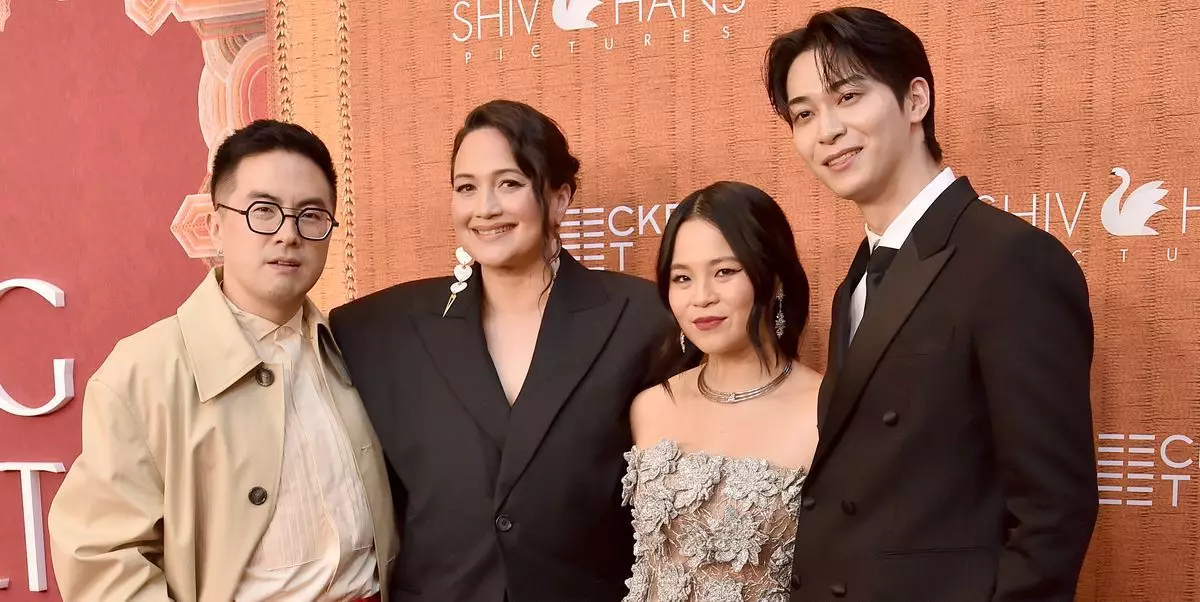The Wedding Banquet emerges as a vibrant expression of love and identity amidst the complexities of cultural expectations in today’s society. Directed by Andrew Ahn, this fresh take on Ang Lee’s iconic 1993 film promotes a nuanced narrative woven with humor and warmth. Set against the backdrop of Seattle, this romantic comedy shifts the focus onto the lives of four friends entangled in the challenges of love and acceptance, ultimately redefining the conventional understanding of commitment.
The plot centers around Min, a closeted Korean heir portrayed by Han Gi-chan, who finds himself on a precarious path. To secure his place in the U.S., he proposes a green card marriage to Angela, played by Kelly Marie Tran, who, in exchange for her cooperation, demands financial support for her partner Lee’s (Lily Gladstone) IVF journey. What starts as a convenient arrangement soon spirals into a grand cultural celebration when Min’s traditional grandmother insists on orchestrating an extravagant Korean wedding.
Characters at the Heart of Change
Each character brings a unique perspective to the film, allowing audiences to witness an authentic exploration of personal identity amid fierce societal norms. Gladstone’s portrayal of Lee allows her to showcase a comedic side, highlighting the balance of humor and seriousness that drives the narrative. In an interview, she expressed her enjoyment in stepping away from the conventional ‘straight man’ role while embracing her small yet impactful moments of hilarity.
Tran’s experience shaping Angela reflects an emotional journey that resonates with many viewing the film. Her public coming out during the production was a transformative moment, and she spoke candidly about the liberating experience of celebrating her identity through her character. “I don’t want to hide this part of myself in this beautiful piece of art,” she said, fortifying the film’s underlying theme of authenticity and acceptance.
A Collaborative Legacy
One of the most compelling aspects of The Wedding Banquet is its roots in the original film, with co-writer James Schamus returning to preserve the essence of what made the 1993 classic memorable. Gladstone notes the charm of the original is retained while introducing new dimensions of storytelling that reflect contemporary societal shifts. This collaboration underscoring the film’s lifeline amplifies the message that these experiences are universal and timeless.
This approach not only preserves nostalgia but also breathes new life into a narrative that resonates with a new generation. Ahn brings a personal touch to the storytelling, intending for his cast and crew to foster lifelong bonds through this project. In emphasizing that filmmaking is a collective journey, he highlights the significance of community—the heart of any celebration, be it familial or chosen.
Reflection of Society and Modern Relationships
As much as The Wedding Banquet embodies a festive celebration, it is equally a mirror reflecting today’s evolving dialogue around love and identity. The growing acceptance of queer relationships, especially within traditionally conservative cultures, is beautifully encapsulated in the interactions between the characters. This narrative demonstrates that marriage can extend beyond a romantic contract, embracing deeper connections that encompass friendship, support, and mutual understanding in diverse forms.
Min’s struggles with his identity, coupled with Angela’s assertive approach to her needs, not only leads to comedic outcomes but also provokes thought about the expectations thrust upon them by family and society. The film artfully reveals how true love isn’t merely about romantic entanglement but also the complex tapestry of what it means to create a family, chosen or not.
With an impressive cast delivering compelling performances, The Wedding Banquet is poised to leave an indelible mark on its audience, illustrating that it is not merely a celebration of love but an exploration of what it means to be true to oneself. It wraps complex narratives in humor while allowing for cathartic moments that validate the experiences of many who have faced similar crossroads in their own lives. The fusion of joy and earnestness in its storytelling affirms its position as both a spiritual sequel to the original and a new classic in its own right, ready for contemporary audiences hungry for authentic tales of love and acceptance.

